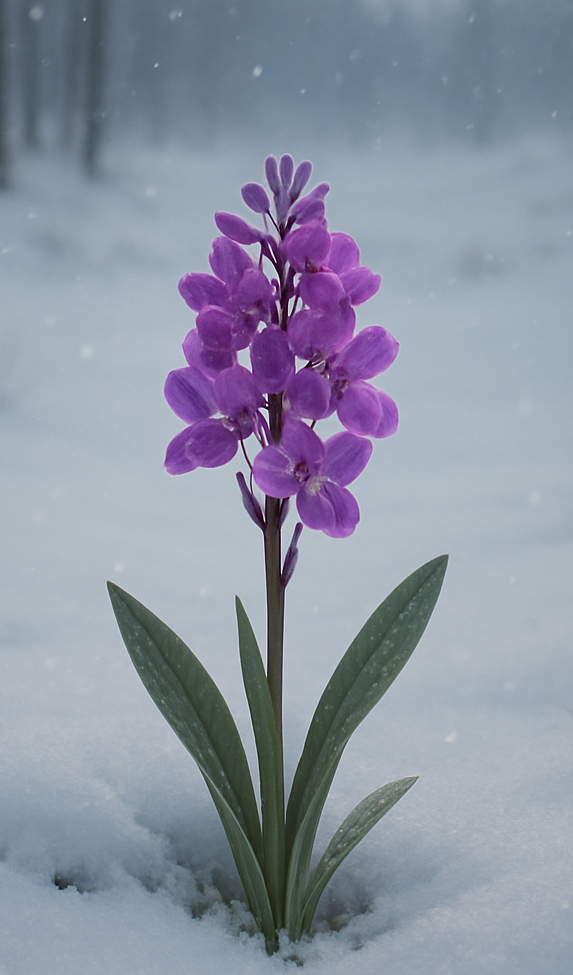A Reflection on Trust, Patience, and the Quiet Strength of the Soul
This morning, I write to you from a familiar perch—the breakfast nook, where light filters gently through the window and the world begins anew. Yet amidst the constancy of this place, something quietly remarkable met my gaze: the orchid on the counter, long dormant and still, had unfurled a new bloom, in fact not one but six stems! For months it had stood as little more than a memory of beauty, offering no sign of change, simply biding its time. And yet today—unexpected, unsummoned—it blossomed. In that small unfolding, I felt the echo of my own seasons of waiting. Waiting for what, exactly, I often could not say. Waiting for healing, perhaps, or for clarity, or simply for life to stir again in places that had grown still. It reminded me that even in long silence, something unseen may be preparing to bloom.
There comes, in every life of reasonable duration, a season—or more truthfully, several—when our spirit is troubled, unmoored amidst the rolling fog of despair. It is an ancient experience, and yet each encounter with it feels as intimate as breath. We need not look far to see it: the sorrow that follows personal loss, the weariness wrought by the world’s endless upheavals, or that quiet, aching loneliness which seems to settle in the heart as the seasons of life turn toward their middle years.
At such moments, when the daylight of certainty fades and the night stretches long, it is tempting—understandably so—to withdraw, to conclude that hope has failed and that the soul must simply endure. And yet, within that very darkness lies an invitation: to nurture faith. Not the tidy, easily-won faith of youth, nor the boastful confidence that all shall turn out precisely as we please, but a more tempered faith—a faith forged in the crucible of experience and deepened by doubt.
You see, faith of this kind is no flimsy sentiment. It is not the province of naïveté. Rather, it is a deliberate undertaking—a conscious act of defiance, even—in which we choose to believe in something greater, even when all external evidence might argue otherwise. It is, in short, a quiet rebellion of the heart against despair’s insistent whisper.
In those hours when faith feels most elusive—when it seems to sift through our fingers like so much dry sand—it is not uncommon to find ourselves awash in questions without answers, doubts without resolution. Here, in this place of stark vulnerability, faith becomes not a grand edifice but a seed—small, hidden, and in need of tending. Like any living thing, it requires patience, humility, and care. It grows not in grand gestures, but in small acts of trust: in the lighting of a candle, the writing of a letter, the noticing of a bird’s song on an otherwise silent morning.
To cultivate faith in this way is not to dismiss despair, but to resist its finality. It is to search, amidst the ash and rubble, for the faintest glimmer of beauty or grace. It is, perhaps, to glimpse a painting or a poem and feel the stirring of something eternal. William Blake, in his singular fashion, saw “a world in a grain of sand,” reminding us that transcendence often resides not in escape, but in attention. Such moments are not grand deliverances; they are gentle affirmations that all is not lost.
And if the poets have their role, so too do the novelists. Dostoevsky, no stranger to anguish, spoke of suffering not as a curse but as a crucible. He knew, as we too must come to know, that it is often through our deepest trials that the soul is refined and our capacity for compassion expanded. In pain, we meet our limits—and in meeting them, we encounter the divine.
Of course, I must also speak a word for patience. Faith, properly understood, does not arrive in haste. It lingers at the edges, waiting for us to notice, to make space for its quiet voice. In times of great distress, it may seem that heaven itself has grown silent. But silence, I would suggest, is not absence. It is presence in another form—more subtle, more demanding, but no less real.
The seed of faith planted in the soil of suffering does not sprout overnight. It may lie dormant for a season—or many. But this does not mean it is dead. Far from it. Growth, though slow, is still growth. And in time, that seed may become a tree under which others may rest.
To nurture faith, then, is to enter into an ancient rhythm. It is to walk forward—not quickly, not carelessly, but with deliberate steps—through landscapes both luminous and shadowed. It is to believe that beyond this present sorrow there lies something enduring, something good, something that calls us onward.
And so, dear friend, let us not retreat in the face of despair. Let us, instead, till the soil of our spirits with gentleness and resolve. Let us water the tender shoots of trust with patience. And above all, let us believe—quietly, courageously—that the dawn shall bloom again.





